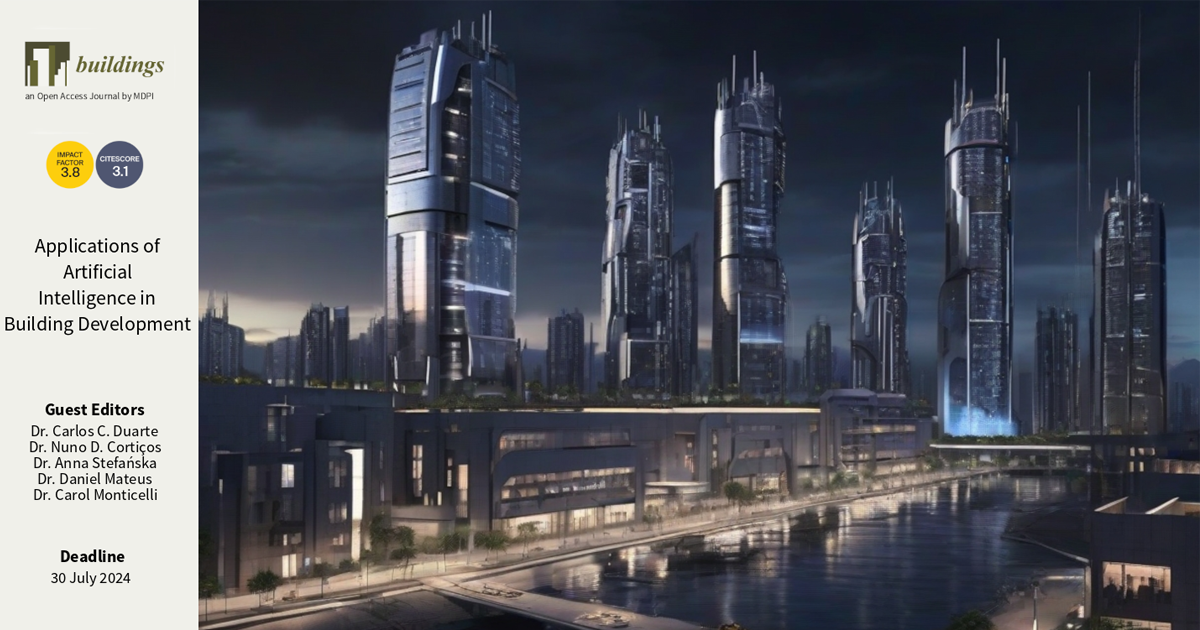Applications of Artificial Intelligence in Building Development
A special issue of Buildings (ISSN 2075-5309). This special issue belongs to the section "Construction Management, and Computers & Digitization".
Deadline for manuscript submissions: closed (30 July 2024) | Viewed by 16697

Special Issue Editors
2. Lisbon School of Architecture, Universidade de Lisboa, Rua Sá Nogueira, Polo Universitário do Alto da Ajuda, 1349-063 Lisbon, Portugal
Interests: bioclimatic design; passive design; sustainable architecture; building energy retrofit; building energy simulation; heritage buildings; NZEB; construction technology
Special Issues, Collections and Topics in MDPI journals
Interests: building physics; environmental comfort; building energy models (BEM); building energy simulation (BES); Internet of Things (IoT); digital twins (BEM + BES + IoT)
Special Issues, Collections and Topics in MDPI journals
Interests: architecture; construction; sustainability; interdisciplinary design; parametric design; energy saving
Special Issues, Collections and Topics in MDPI journals
Interests: architecture; energy; computation; sustainability; building energy modeling; building information modeling; algorithmic design; parametric design; urbanism; design
Special Issues, Collections and Topics in MDPI journals
Interests: technology of architecture; construction systems’ innovation; sustainable building materials; eco-efficiency; environmental impact assessment; life cycle assessment; life cycle thinking; design for disassembling; design for re-manufacturing; design for reuse; embodied energy; lightweight building materials; architectural membranes; technical textiles for buildings
Special Issues, Collections and Topics in MDPI journals
Special Issue Information
Dear Colleagues,
In a world powered by artificial intelligence (AI), urban planning, neighbourhood revitalisation, tactical urbanism, community-led initiatives, transit-oriented development (TOD), green infrastructure, historic preservation districts, pocket parks, complete streets, micro-mobility solutions, local business support, and city management are undergoing a transformative revolution. Cities are increasingly becoming more efficient, sustainable, and liveable.
AI empowers urban managers and policymakers, equipping them with data-driven insights from extensive datasets encompassing all facets of a city's comprehensive societal ecosystem, ranging from traffic patterns to the demographics of community well-being. This augmented understanding enables the optimisation of land utilisation, implementation of sustainable practices, and improved resource management, ultimately fostering the development of resilient and thriving cities.
AI is an indispensable ally in today's architectural, engineering, and construction landscape, providing transformative support across the entire building lifecycle. From design to decommissioning, AI enhances architectural design, streamlines construction operations, optimises energy efficiency and occupant comfort, proactively maintains systems, and guides sustainable decommissioning. This comprehensive AI integration ensures buildings stay dynamic, efficient, and sustainable throughout their entire lifecycle.
AI aids architects in creating visually appealing and structurally sound designs, streamlines construction operations, enhances safety, and improves efficiency. As buildings enter their operational phase, AI ensures energy efficiency and occupant comfort. Predictive analytics prevent disruptions during maintenance and decommissioning, and AI guides sustainable strategies. This comprehensive AI support empowers professionals to deliver aesthetically pleasing, structurally robust, efficient, sustainable, and cost-effective buildings from inception to retirement.
This Special Issue explores AI's profound impact on urban development, city planning, building design, construction, maintenance, and energy efficiency. It offers a glimpse into a future wherein AI guides us towards more sustainable, efficient, and remarkable cities and structures.
The proposed Special Issue addresses the following research fields:
- AI in architectural design;
- AI-powered engineering solutions;
- Construction industry advancements with AI;
- Sustainable building design with AI;
- Structural engineering and AI;
- AI-assisted building construction;
- Building maintenance automation with AI;
- AI in infrastructure planning;
- Urban development with AI-driven construction;
- Resource optimisation in civil engineering with AI;
- AI for sustainable building practices;
- Reducing GHG emissions through AI-enhanced energy efficiency.
Dr. Carlos C. Duarte
Dr. Nuno D. Cortiços
Dr. Anna Stefańska
Dr. Daniel Mateus
Dr. Carol Monticelli
Guest Editors
Manuscript Submission Information
Manuscripts should be submitted online at www.mdpi.com by registering and logging in to this website. Once you are registered, click here to go to the submission form. Manuscripts can be submitted until the deadline. All submissions that pass pre-check are peer-reviewed. Accepted papers will be published continuously in the journal (as soon as accepted) and will be listed together on the special issue website. Research articles, review articles as well as short communications are invited. For planned papers, a title and short abstract (about 100 words) can be sent to the Editorial Office for announcement on this website.
Submitted manuscripts should not have been published previously, nor be under consideration for publication elsewhere (except conference proceedings papers). All manuscripts are thoroughly refereed through a single-blind peer-review process. A guide for authors and other relevant information for submission of manuscripts is available on the Instructions for Authors page. Buildings is an international peer-reviewed open access semimonthly journal published by MDPI.
Please visit the Instructions for Authors page before submitting a manuscript. The Article Processing Charge (APC) for publication in this open access journal is 2600 CHF (Swiss Francs). Submitted papers should be well formatted and use good English. Authors may use MDPI's English editing service prior to publication or during author revisions.
Keywords
- artificial intelligence
- smart buildings
- smart urban grids
- adaptive design
- RES systems
- building automation and maintenance
- machine learning
- smart construction
- sustainable design
Benefits of Publishing in a Special Issue
- Ease of navigation: Grouping papers by topic helps scholars navigate broad scope journals more efficiently.
- Greater discoverability: Special Issues support the reach and impact of scientific research. Articles in Special Issues are more discoverable and cited more frequently.
- Expansion of research network: Special Issues facilitate connections among authors, fostering scientific collaborations.
- External promotion: Articles in Special Issues are often promoted through the journal's social media, increasing their visibility.
- Reprint: MDPI Books provides the opportunity to republish successful Special Issues in book format, both online and in print.
Further information on MDPI's Special Issue policies can be found here.









